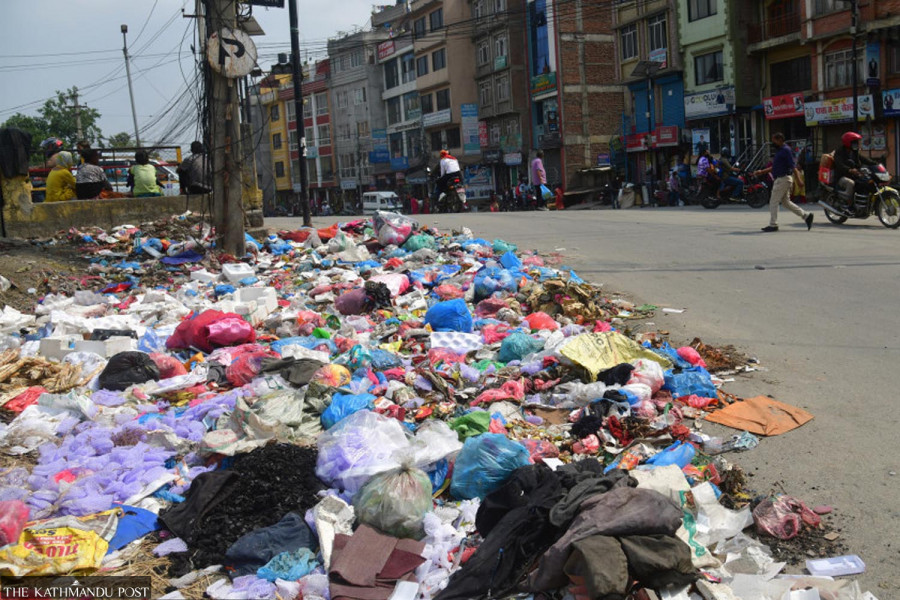
When the Kathmandu Metropolitan City announced strict waste management measures, Rajesh KC, manager of Sasa Banquet in Naya Bazaar, saw the end to his woes. His business would no longer have to suffer because of the waste dumped immediately outside the banquet, or so he thought.
The City had issued a notice to segregate waste at the source from July 17 and to regulate garbage disposal by the roadside and street corners in order to manage waste collection and disposal, but to KC’s dismay, the City hasn’t collected the piles of garbage dumped outside his banquet in Ward No 16 for over a week.
“Forget waste segregation, the garbage piled here is on the verge of turning into a mound because the City has not collected garbage for over a week,” said the 33-year-old, adding that every night people come on motorcycles and cars and throw garbage outside the banquet and leave. “But the City has not booked any of them. The immediate area outside the banquet has been used as a garbage dump for years.”
In the past two and half months, KC says, about half a dozen scheduled events at his banquet were cancelled. “I haven’t been able to run the business properly because of the garbage issue,” he said. “The stench from the garbage is everywhere and the whole area stinks. This has greatly affected my business.”
The City had said it would fine garbage litterers under the Solid Waste Management Act, 2068 (2011). The Act states that offenders will be fined anywhere between Rs500 and Rs15,000. In a notice published on its website, the City also announced booking litterers under the Environment and Natural Resources Preservation Act 2021, which allows authorities to fine anyone found littering between Rs30,000 and Rs 50,000.
KC’s banquet is just a case in point. The roads, alleys and open spaces in Kathmandu are again dotted with piles of garbage. The City has deployed its staff to pack the garbage in black plastic bags before transferring it to the dumping site, but in many places, stray animals searching for scrap food tear open the plastic bags and litter the streets again.
“It’s been five days since garbage has not been collected from our area,” said Bishnu Hari Khanal, 49, who owns a grocery shop in Dhobichaur.
“We have been segregating waste at home, but garbage collectors dump it all into one truck without segregation. When the City makes a rule it must ensure its proper implementation.”
In response to Khanal’s complaint, Sunil Lamsal, an engineer and waste management consultant and secretary to the mayor, says although the City has asked everyone to segregate waste at source, private waste management companies are still collecting garbage without segregating it.
The City has made it mandatory for garbage collectors to segregate waste in wards 12, 17, 18, 19, 20, 21, 22, 23, 24, 25 and 27 of the metropolitan city.
The City had specified days to collect biodegradable and non-biodegradable wastes in a week with the former to be collected four days a week and the latter two days a week.
“We have found that segregation is not happening in areas where private companies are collecting waste,” said Lamsal. “Gradually, we will make it compulsory in all 32 wards of the metropolis.”
The commitment to solve Kathmandu’s garbage problem by Mayor Shah has largely been neglected in the past few weeks, and the City’s present inability to collect garbage has irked citizens both offline and online.
Journalist Sujit Mahat on Tuesday shared a photo of piles of garbage on the roads of Kathmandu mainly from the Battisputali area. In his tweet, he questions if Shah is going to spend his five-year term without solving the garbage issue.
Shah has listed waste management as his foremost priority ever since he won the mayoral race as an independent candidate on May 26. However, the mayor and his office have yet to find a permanent solution to the decades-old problem.
Mayor’s secretary Lamsal says the main reason behind the City’s failure to collect garbage for the past week or so is the ongoing blacktopping work on the road section leading to the Banchare Dada dumping site.
“The construction company working on the road project asked for a week to repair the road,” said Lamsal. “We will resume collecting garbage from Thursday.”
According to City officials, Mayor Shah visited Sisdole last Saturday to inspect the road repair work, and the contractor assured him that the work would be completed within the stipulated time.
“Once the road is ready, we will strictly enforce the garbage segregation rule,” said Lamsal. “There will be no garbage piles from next week.”
The discontinuation of garbage collection this time may be attributed to the road repair work but the City has been facing problems in garbage transportation during the rainy season along the 27km road stretch leading to Sisdole and Banchare Danda for years now.
Since the start of the monsoon season this year, there has been disruption in waste collection owing to bad roads. On July 11, the City had to use 40,000 square feet of plastic tarp to cover the ever-growing garbage pile at Teku transfer station.
Every day, the 18 municipalities in Kathmandu Valley generate over 1,200 metric tons of solid waste, of which around 60 percent is generated from the Kathmandu Metropolitan City alone.













